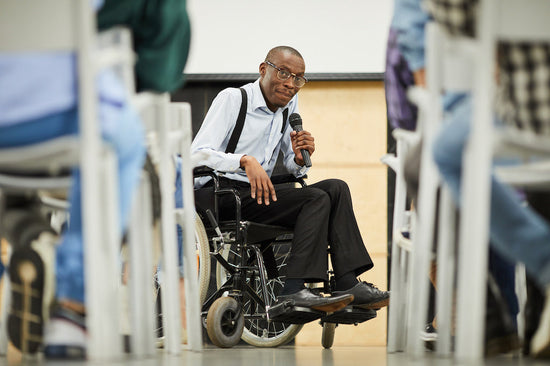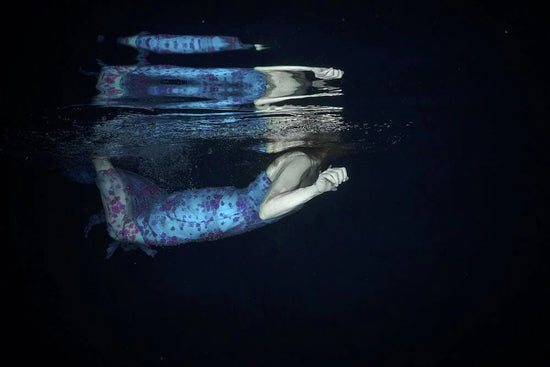
Born with club feet
"Being disabled is not what holds us back—it’s the barriers we face every day." | Photo Credit ©Drobot Dean / Adobe Stock
Growing up with club feet
I am disabled.
Three simple words, aren’t they? But you have no idea how long it’s taken me to come to terms with them.
Back in the seventies, I was born with club feet twisted at an odd angle. Right from the beginning of my life, I underwent a series of sometimes painful—almost always uncomfortable—procedures that included casts, splints, and surgery. One could call them corrective procedures, but that implies I needed to be reshaped into a form society would accept. I’ll have scars until the day I die.
Throughout all of this, no one ever told me I was disabled.
Most people might think this is no big deal; if I had considered myself disabled, I would have let myself be limited or held myself back. This unfortunate attitude needs to die a quick and painful death.
Being disabled is not what holds us back—it’s the barriers we face every day. It’s having to walk up and down multiple flights of stairs because there’s no washroom on the ground floor. It’s bar stools with no support so that even though we’re sitting, we’re still clenching our core in an effort not to fall over. Its spaces are too narrow for our mobility aids.
"Being disabled is not what holds us back—it’s the barriers we face every day."
All of these take away what spoons we have, which on some days can be precious few. (Using spoons as the unit of measurement for the stamina required to do simple tasks comes from Christine Miserandino’s Spoon Theory.)
I can only guess at what being able to identify as disabled would have let me do back in the day, especially if I could have been more open about it.
I know it would have saved me a lot of anxiety, depression, and guilt for not being able to do everything the other kids could.
Focusing on what I could do and looking to make small improvements, rather than rushing to try and keep up with the other kids, would have prevented a lot of pain.
Not being allowed to consider myself disabled means I worked jobs I should have avoided, because otherwise, I was a no-good, lazy bum. It meant taking anti-inflammatory medication, later discovered to be connected to heart problems, just so I could survive an eight-hour shift on my feet in a convenience store. It meant not getting orthotics until a year ago, doing who knows what preventable damage to my body.
It meant destroying myself to pretend I was able-bodied.

So, after years of those body-destroying jobs, I found something that’s only slightly soul-crushing instead. (I kid, but working tech support will show you the dark heart of humanity.) Now I can afford the tools and physical training I need to maintain and start improving my mobility.
This doesn’t mean I’m no longer disabled, or that I’ll reach a point where I’m not. My disability is always going to be with me, and knowing that is freeing.
It took me a long time to understand this, especially because society doesn’t allow disabled folk to just be. We’re depicted as either inspiration porn or villains.
"My disability is always going to be with me, and knowing that is freeing."
The inspiration porn of being born with club feet
We’ve all seen inspiration porn. It’s those movies where the plucky disabled person overcomes adversity and shows just how capable, brave, and strong they are. Or the YouTube videos of disabled inspirational kittens. They’re an inspiration to everyone around them because though life dealt them a bum hand, they don’t let it stop them. How uplifting!
What a dinosaur-sized pile of crap.
Human beings are amazingly resilient creatures, able to adapt to any number of situations, but we’re still just flesh and blood and only able to do so much. Also, not everyone has the strength or stamina of those inspirational porn stars. I know I can’t run like Terry Fox, but able-bodied people seem to assume that any disabled person can with enough grit and motivation.
Inspiration porn sets up an expectation that disabled people often can’t and never should have to live up to. It lets able-bodied people avoid thinking about the barriers we face, often barriers erected by the able-bodied or at least ignored by them.
We’re not here to make others feel inspired by our struggles, we just want to live our lives and see those barriers removed.
We’re not your feel-good story.
Neither are we the villains. Plenty of disabled people have every reason to be angry and lash out, but if you believe Hollywood movies with disabled people, we’re either overcoming hardships or plotting revenge against the world.
Even if some of us dream about taking over humanity, most of us are too damn tired to follow through.
It’s not our disabilities that turn us against other people, it’s the fact that most people are unintentionally ableist assholes. To give you an example from my own life, a former friend of mine developed a rare cancer that caused his legs to give out, requiring him to use a mobility aid and giving him a taste of what many disabled people struggle with every day. What was his reaction? He contemplated suicide at the thought he could be disabled for the rest of his life and confided this to me, someone who very well could end up mobility disabled later in life.
Is it any wonder there’s a deep vein of anger that can be tapped for Hollywood to draw on? When even those we considered friends would rather die than live like us. Internalized ableism is a real thing, often metaphorically ingested from multiple sources, including popular media.
I haven’t even mentioned the other issues related to disability. For those of us who are physically disabled, we often face fat-phobia from having bodies that can’t diet and exercise enough to fit societal expectations. For those of us with mental disabilities, those of us who are neurodivergent, we face a world that doesn’t understand how we’re wired differently and can’t conform to societal standards no matter how hard we twist our brains to fit in.
Despite what the world tells us, disability is not something we should ever be ashamed of or deny. It’s a part of who we are, who I am, and it’s taken me a long time to come to terms with this.
If anyone reading this has not experienced disability, neurodiversity, and/or mental illness, I hope I’ve given you a better understanding of what we face. And that you’ll remember we’re people who have ambitions and want to thrive.
We’re still human.
Treat us as such.
“Born with Club Feet” is republished from Word Gathering under Creative Commons Attribution-NonCommercial-NoDerivatives 4.0 International license.
"Being disabled is not what holds us back—it’s the barriers we face every day."










